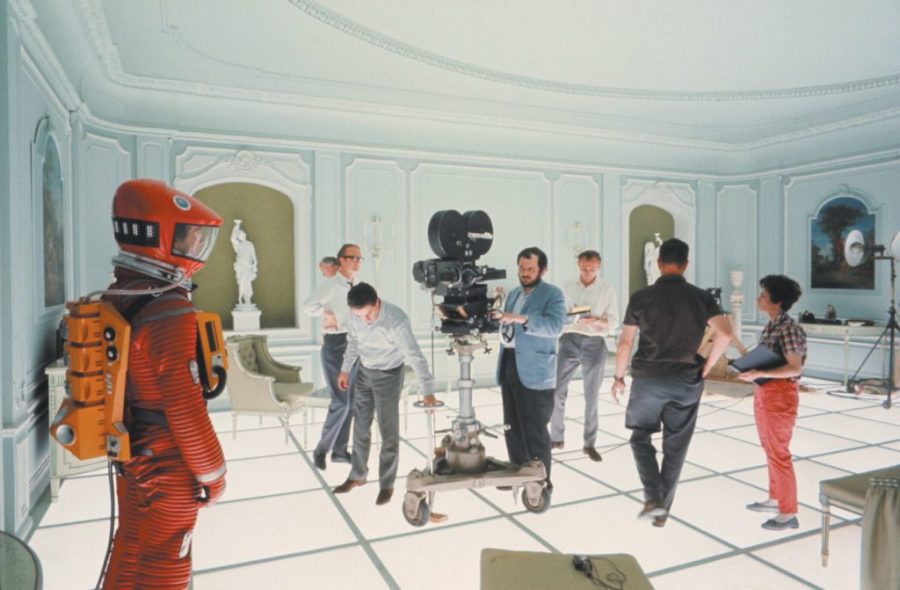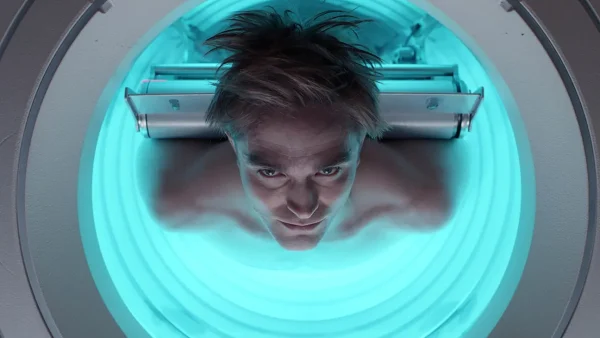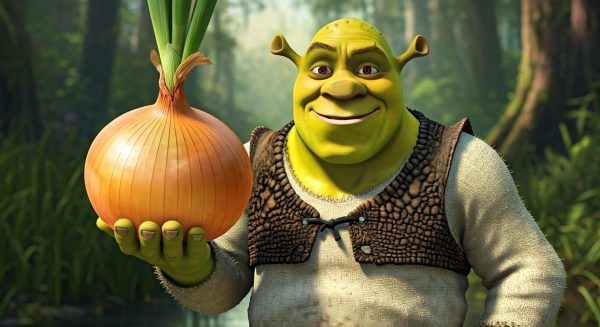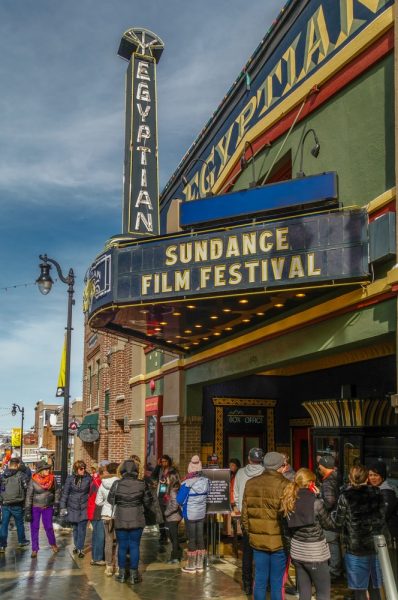2001: A Space Odyssey and Reaching Into The Unknown
On the 2001: A Space Odyssey (1968, Dir. Stanley Kubrick). Kubrick is shown at center behind the camera.
In 1968, Stanley Kubrick changed the world with the release of 2001: A Space Odyssey. Usually, at the beginning of a review like this, I would give a quick summary of the plot to help introduce the film to those that may be unfamiliar. But in this case, I don’t think a quick retelling of the events that conspire over the course of the two and a half hour runtime of this film will bring you any closer to understanding the power behind the imagery that we are so helplessly exposed to. That is because the plot is not the point, messages and themes are communicated less through dialogue and events and more through sight and sound and emotion. Through a terrifying understanding of both the craft of film and the human race, Stanley Kubrick uses now-iconic cinematic techniques to create one of the most interesting and important pieces of art of the 20th century.
Bear with me here, but allow me to provide an effective metaphor that has helped me understand 2001: A Space Odyssey and all of the films in Stanley Kubrick’s impressive body of work that I have seen. There is still a lot of debate in the world of clinical psychology over the significance and evolutionary benefit of dreams, even today. But my favorite theory is that dreams are meant to compartmentalize and synthesize the myths and feelings that we have in our waking hours into something that we can better understand. I have often woken up the next morning after a hard day feeling better about things that I felt hopeless about the night before, and whether I remember them or not, besides the much-needed rest I received I’m certain dreams have played a part in helping me sort things out in my head. Dreams are stories that help you understand your life, and I think that in a very similar way films are stories that help you understand the human race. In short, films are the collective dreams of society. 2001: A Space Odyssey feels like a dream in that way. Intensely profound themes that have been important for thousands of years are communicated through Kubrick’s meticulous mastery over his craft. What is the destiny of the human race? What is higher intelligence and consciousness? Will our technological advancement eventually be our undoing? How are we impacted by the grand mystery of the universe? These are questions that philosophers have been wrestling with for hundreds of years. How could one movie even begin to try and provide answers to such complex questions? Simple: they don’t provide answers at all. Instead, Kubrick gives us a cryptic set of images that hold the answers deep inside, and we as an audience are meant to break down those images to their basic elements and dissect them in order to find them out for ourselves. Whether this was Kubrick’s intention or not is beside the point, I have heard his explanation as to what happens to Dave in the waiting place and I find it incredibly dissatisfying. Kubrick was a very smart guy, and I believe that providing that answer was meant to be dissatisfying in order to let us know that what he thinks about the movie doesn’t matter. We were given these images, we were given this story. It was a gift to us and now as audience members, we own it just as much as he did. Therefore, any interpretation is valid. Scratch that, maybe most interpretations are valid.
2001: A Space Odyssey is an example of a new myth, much like a Bible or Beowulf for the modern age. It is no coincidence that they use the word, “Odyssey”. One aspect of this film that seems mythic in proportion is the ever-mysterious Monolith. Completely understanding the origin and significance of The Monolith probably takes away some of its power, but I’ll try my best to provide some of my thoughts on it. The Monolith appears completely out of nowhere, at a time when it seemed like Humanity needed it most. The apes are living a life of desperation. They do not have the capability to get access to the food that would be most beneficial to them, and they are often starving, eating the scraps of other creatures. Protein helps promote brain function and muscle growth, and many evolutionary scientists point to our newfound access to protein-rich foods as our key to evolving into what we are today. Some believe it was our ancient use of psychoactive plants that helped us reach that level of enlightenment, and maybe The Monolith is a metaphor for that but that is a discussion for another day. Anyways, whatever The Monolith is, it chooses a small tribe of ancient humans and arrives. It arrives while the apes are sleeping, and when they are awoken we hear a cacophonous mess of moaning voices that add to the mysterious nature of The Monolith. Whether the apes can hear the voices or not is not interesting to me, but the significance behind those voices most definitely is. To me, they seem to be shouting out in pain. This should be a triumphant moment, the arrival of higher intelligence to the planet Earth, why is it introduced with such melancholic mourning? The triumph does come later as Moonwatcher destroys the pile of bones with his newfound will, but right when we meet the Monolith we are meant to be afraid of it just as much as the apes are. The Monolith is otherworldly and unnatural, just like human consciousness. There is nothing natural in the world quite like a human’s ability to think for him/herself, which has prompted people for thousands of years to explain that phenomenon away with the idea of some higher power. The apes touching the monolith is such a powerful image because we have seen it before. That moment burrowed itself deep into my mind and when I think about it I often associate it to Michelangelo’s painting, “The Creation of Adam”. There is something about Human Beings that make us special, our intelligence has given us a will over our universe unlike any other creature on this planet. From the moment that the apes begin to use the bones as tools, they are never the same, they have ascended the natural order and have become unnatural just as The Monolith is. They have cheated certain extinction and natural selection, and the significance of that power being brought to us from some higher plane is a fascinating concept. From that moment on they are no longer animals, they are no longer prey to the beasts of the wild. They are human, they are Gods.
Writing this review I realize that I could write a whole book on this movie, and I want to write forever. But I will be sensitive to your time. I mean hell, I’ve written more than 1000 words so far and I’ve only talked about the first twenty minutes of the movie. I would love to get into further interactions with The Monolith and Dave’s war with HAL, but I don’t have enough time. 2001: A Space Odyssey is necessary viewing for the human race. It bends your mind and makes you want to seek out truth and knowledge. The kind of introspection that this movie fosters is very important. If you open up your mind to Stanley Kubrick you will never be disappointed. In summary: turn on, tune in, and drop out.






